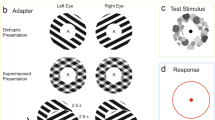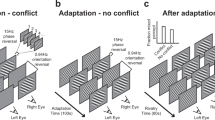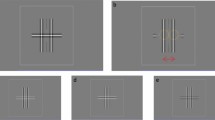Abstract
THERE has been a long dispute as to whether visual after-images arise retinally or centrally. An after-image produced in one eye may be seen as if with the other when that alone is open1. This transfer of after-images may be due to a persisting central change produced by stimulation of the one eye, or by after-discharge from the stimulated eye being seen as though it arose from the non-stimulated eye. Both mechanisms may be operating but it has never been possible conclusively to dissociate the two possibilities under these conditions.
This is a preview of subscription content, access via your institution
Access options
Subscribe to this journal
Receive 51 print issues and online access
$199.00 per year
only $3.90 per issue
Buy this article
- Purchase on Springer Link
- Instant access to full article PDF
Prices may be subject to local taxes which are calculated during checkout
Similar content being viewed by others
References
Sumner, F. C., and Watts, F. P., Amer. J. Psychol., 48, 109 (1936).
Craik, K. J. W., Nature, 145, 512 (1940).
MacKay, D. M., Nature, 180, 849 (1957).
Author information
Authors and Affiliations
Rights and permissions
About this article
Cite this article
HOWARD, I. Some New Subjective Phenomena Apparently Due to Interocular Transfer. Nature 184, 1516–1517 (1959). https://doi.org/10.1038/1841516a0
Issue Date:
DOI: https://doi.org/10.1038/1841516a0
Comments
By submitting a comment you agree to abide by our Terms and Community Guidelines. If you find something abusive or that does not comply with our terms or guidelines please flag it as inappropriate.



